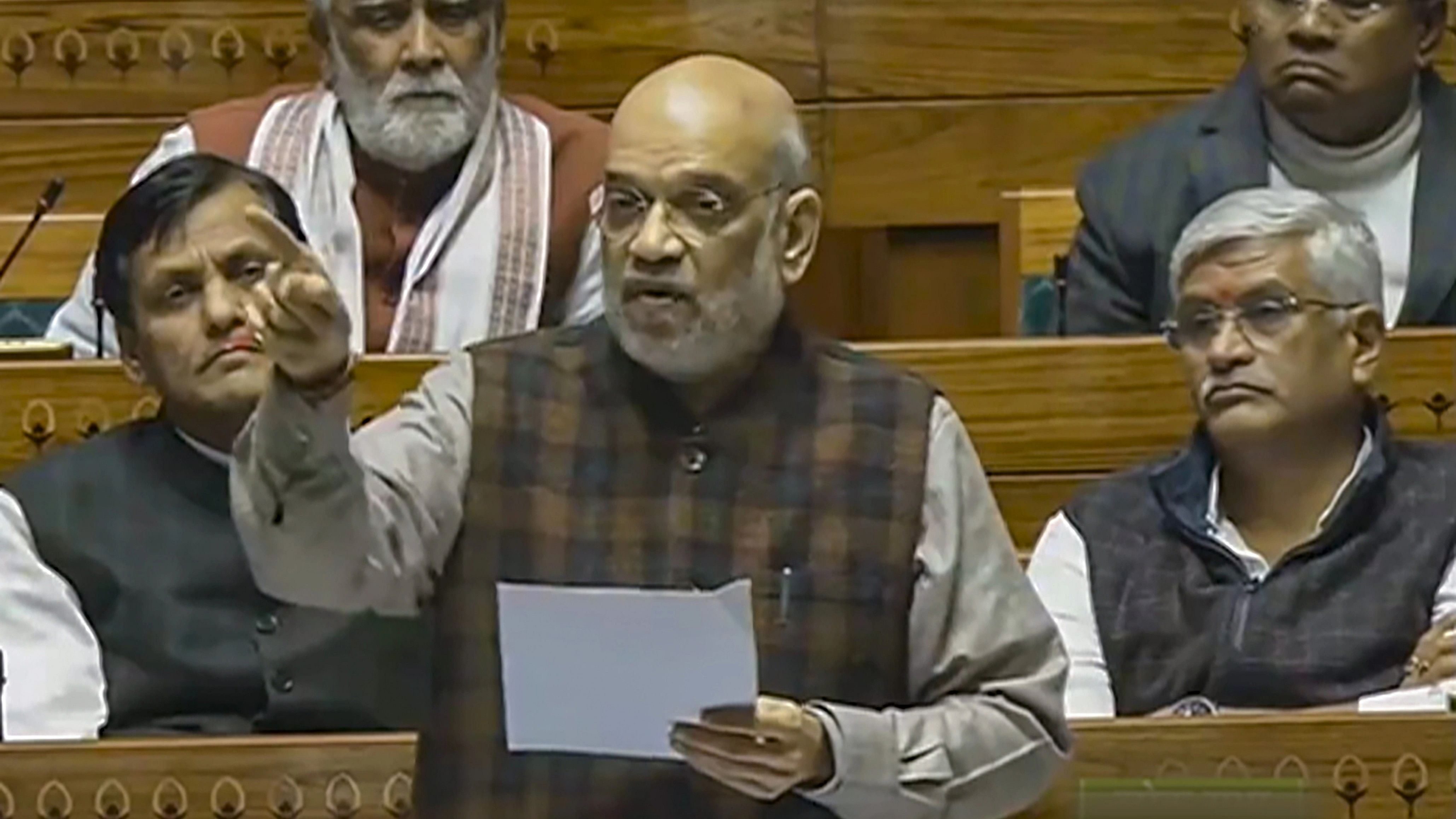
Union Home Minister Amit Shah speaks in the Lok Sabha during the Winter session of Parliament, in New Delhi, Wednesday, Dec. 20, 2023.
Credit: PTI Photo
New Delhi: The Lok Sabha on Wednesday passed three bills — the Bharatiya Nyaya (Second) Sanhita Bill, the Bharatiya Nagarik Suraksha (Second) Sanhita Bill and the Bharatiya Sakshya (Second) Bill — which aim to revamp the criminal laws by replacing the decades’ old criminal codes, amid the suspension of Opposition MPs. Union Home Minister Amit Shah said the new bills will free people from a colonial mindset.
“The three laws were made during the time of the British; if the laws are not repealed, the UK laws will continue in the country… terms like ‘Her Majesty’, ‘London Gazette’, ‘British Crown’ and ‘barrister’ continue to be used in India because of the laws,” Shah said, speaking on the Bills which will replace the Indian Penal Code, the Code of Criminal Procedure and the Indian Evidence Act.
Shah said the bills will bring in a “victim-centric”, “evidence-based” system that has “ease of justice”. He said that over 3,200 suggestions were drawn in from various quarters like the Supreme Court, high courts, MPs and MLAs, IPS officers and DCs. Shah also took the opportunity to make a political point, saying that the BJP is the only party that has managed to fulfil every promise of its 2014 manifesto.
He said that “a comprehensive discussion” on the Bills was carried out where he, the home ministry and BPR&D wrote to governors, CMs, CJI, high court chief justices, MPs, MLAs, law institutions and IPS officers. “The process started in August 2019, and by March 2020, the suggestions came in,’’ Shah said.
‘‘Eighteen states, 6 Union Territories, Supreme Court, 16 high courts, five law academies, 22 National Law Universities, 42 MPs and 200 IPS officers sent suggestions. In all, 3200 suggestions came,” Shah said. “We said that in Ayodhya, we will make Ram Mandir soon, and on January 22, Lord Ram’s idol will be installed there,” Shah said.
“This is PM Modi’s government which delivers what we say. We said we will give 33% reservation to women in Parliament and assemblies, and we did it. We said we will abrogate Article 370, and we did it. We said we will have zero tolerance to terrorism, and now instances of terrorism in J&K, Northeast and Naxal-hit areas have come down significantly, too,” Shah added.
With 97 suspensions, two-thirds of the Opposition were missing when discussion took place; leaders like AIMIM MP Asaduddin Owaisi, SAD’s Harsimrat Badal, SAD(A)’s Simranjit Kaur Mann and BJD MP Bhatruhari Mahtab were present. While Kaur insisted on removing the clause allowing only the family of a convict to move a mercy petition, Owaisi asked for rape laws to be gender neutral.
Shah said to decide on appeals and withdrawals, every district will have an independent Director of Prosecution. Shah said speedy justice will be a hallmark of reforms brought in by the bills. “For the poor, the biggest challenge to get justice is financial challenge; for years ‘tareekh pe tareekh’ was what was heard,” he said.
Shah said proceedings of a case, in trial phase, will have to be completed in 45 days, and sentencing by 60 days. He said lawyers cannot reschedule dates on more than 2 occasions. To take on absconders like Dawood Ibrahim, financial scam fugitive Vijay Mallya and Khalistani movement leader Gurpatwant Singh Pannun, Shah said a provision for “trial in absentia” has been introduced, under which trial for these cases will be done in 2 years. “These people are hiding in other countries and trials are not underway. If they don’t appear before court in 90 days, in their absence, trial will go on, a public prosecutor will be appointed. The process to bring them back is easier since it changes their status in other country,” he said.
Among other changes, the offence of “sedition” has been omitted but the new laws penalise acts endangering unity and integrity of India; “rajdroh” has been now changed to “deshdroh”. Shah said people have right to speak against government, but actions and utterances against nation will be punishable. The Bills also penalises mob lynching, recognising it as killing by a mob comprising more than five people. Adultery has not been recognised as criminal act, despite recommendation by Opposition members of standing committee on home affairs.
“This bill punishes mob lynching with death penalty. Congress leader P Chidambaram asked me what about mob lynching, but he does not understand the BJP’s ideology of nation first. Why did his government not penalise mob lynching during their rule? If one’s mind is Indian, you will understand the laws. If it is Italian, you won’t,” Shah said.
The Bills are likely to be taken up by the Rajya Sabha on Thursday.